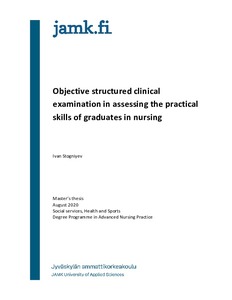Objective structured clinical examination in assessing the practical skills of graduates in nursing
Stogniyev, Ivan (2020)
Stogniyev, Ivan
2020
All rights reserved. This publication is copyrighted. You may download, display and print it for Your own personal use. Commercial use is prohibited.
Julkaisun pysyvä osoite on
https://urn.fi/URN:NBN:fi:amk-2020082619875
https://urn.fi/URN:NBN:fi:amk-2020082619875
Tiivistelmä
Background: In the conditions of the state comprehensive final exam, a comprehensive
assessment of all necessary professional competencies of the graduate is required.
Оbjective: To explore the experiences of students concerning how the Objective structured clinical examination is implemented in Kazakhstan Medical colleges.
Method: This qualitative study was conducted in June 2019. A total of six focus groups (67 participants) were interviewed. The interviews were analyzed using content analysis and an inductive approach.
Results: Data analysis led to the identification of four main themes: (a) preparation for the
Objective structured clinical examination included practical and clinical support, (b) the emotional environment was considered tense, (c) consistency of Objective structured
clinical examination station attributes with respect to training content and time frames,
and (d) organization and realism had an effect on the level of the Objective structured
clinical examination.
Conclusions: The objective structured clinical examination has had a positive impact on
the students ' experience, contributing to the development of clinical skills and increasing
confidence in their knowledge. At the same time, shortcomings were identified in the
organization and conduct of the unified state exam: increased stress levels among
students, insufficient training of exam participants, partial assessment of competencies,
inconsistency of the content of pre‐graduate practice and the OSCE, as well as some
technical shortcomings. In the future, there is a need to improve and integrate
examination programs, practice and training, and to thoroughly prepare students for the
OSCE methodology itself.
assessment of all necessary professional competencies of the graduate is required.
Оbjective: To explore the experiences of students concerning how the Objective structured clinical examination is implemented in Kazakhstan Medical colleges.
Method: This qualitative study was conducted in June 2019. A total of six focus groups (67 participants) were interviewed. The interviews were analyzed using content analysis and an inductive approach.
Results: Data analysis led to the identification of four main themes: (a) preparation for the
Objective structured clinical examination included practical and clinical support, (b) the emotional environment was considered tense, (c) consistency of Objective structured
clinical examination station attributes with respect to training content and time frames,
and (d) organization and realism had an effect on the level of the Objective structured
clinical examination.
Conclusions: The objective structured clinical examination has had a positive impact on
the students ' experience, contributing to the development of clinical skills and increasing
confidence in their knowledge. At the same time, shortcomings were identified in the
organization and conduct of the unified state exam: increased stress levels among
students, insufficient training of exam participants, partial assessment of competencies,
inconsistency of the content of pre‐graduate practice and the OSCE, as well as some
technical shortcomings. In the future, there is a need to improve and integrate
examination programs, practice and training, and to thoroughly prepare students for the
OSCE methodology itself.
